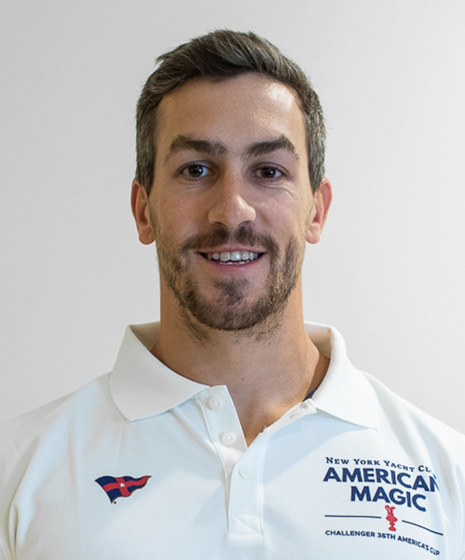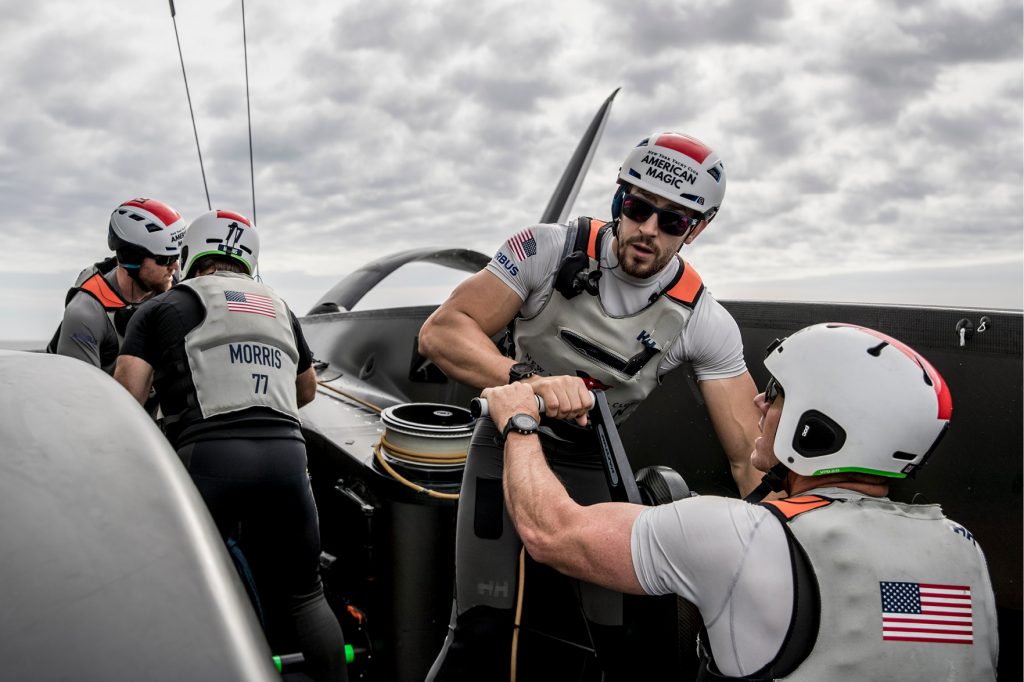
Trevor Burd © Amory Ross/American Magic
Growing up on the water in Marblehead, Massachusetts as the youngest of three brothers shaped Trevor Burd’s passion for competitive sailing and ocean adventure, and he’s raced in far flung places around the world. As a grinder aboard New York Yacht Club American Magic’s foiling AC75, he’s tasked with delivering the horsepower to drive the U.S. challenger to victory in the 36th America’s Cup presented by Prada, scheduled for next March in Auckland, New Zealand.
WindCheck: How old were you when you started sailing?
Trevor Burd: I started junior sailing at Pleon Yacht Club when I was about 8, but didn’t start to fully enjoy it until I was 16 or so.
WC: Did you have any significant sailing mentors? If so, what’s the most important thing you learned from them?
TB: When I was younger I think my biggest mentor was my oldest brother, Tripp. Him being excited and into sailing was one of the key motivators for me to get excited about racing boats. When I was sailing 49ers, I was fortunate to spend a few years sailing with two extremely talented but very different skippers. From Brad Funk, I really learned how to make a boat go quickly, which is something he’s one of the best in the world at. Through the US Sailing Team, I was also exposed to an older generation of sailors such as the McKee brothers who I really looked up to along the way as well.
WC: How did your Olympic campaign in the 49er prepare you for competing for the America’s Cup?
TB: I think the last few years of 49er sailing really helped me to learn about the amount of work and level of dedication it takes to pursue any campaign seriously, whether it’s in a 49er or AC75. The other great thing about Olympic sailing, especially in a technical boat like the 49er, is that you have to learn rigging, some composite skills, and some basic sailing making. Having that breadth of knowledge allows you, at a very basic level, to understand what goes into getting the AC75 on the water and to help out wherever you’re needed.

It takes muscle to make magic. Trevor (facing the camera) spins the handles on New York Yacht Club American Magic’s AC75 Defiant. © Will Ricketson/American Magic
WC: Please tell us about Team FreeBurd, the Race to Alaska, and Mama Tried.
TB: The R2AK was an amazing experience. It’s somewhat on the fringes of the mainstream racing community, but that quirkiness is part of what makes the race special. Team FreeBurd consisted of my two older brothers Tripp and Chris and I. With the three of us spread around the country (and often the world), it was a rare opportunity for us to just be together, let alone compete together. Additionally, my father had passed away a few weeks prior, making the experience that much more meaningful and poignant.
Mama Tried is a heavily modified 8.5m Pete Melvin-designed trimaran, a fleet that’s actually common in Auckland. It’s really the perfect boat for that race; the right combination of size and speed that makes it a weapon even when you’re pedaling along in zero knots of wind.
By far the most memorable moment for me was traveling through Seymour Narrows in next to no breeze, but probably 12 knots of current pushing us forward…in the pitch dark. Halfway through the Narrows we heard what sounded like breaking waves, but was actually a pod of dolphins that stayed with us for a few miles, playing around our hulls.
WC: Please tell us about the selection process for the American Magic Sailing Team.
TB: My selection process started with an email from our coach James Lynne, asking if I could come to Long Beach for a few days for a tryout. That tryout consisted of one day of physical testing and one day of sailing. I think the biggest criteria beyond being fit enough to make it as a sailor on these boats was to see if I would be a culture fit with the group they were already putting together.
WC: What’s it like to sail an AC75?
TB: The thing that surprises people the most when I tell them is the lack of sensation of outright speed. The liftoff is usually so smooth and linear; there are moments where you only know foiling if you take a look out of the cockpit. You become what I call “velocitized” pretty quickly, so you don’t always realize how fast you’re going until you look back and see how hard the chase boats are having to work.
WC: Please tell us about the importance of physical strength as a grinder on an AC75, and your training regimen.
TB: The grinding game has changed in the last few America’s Cup cycles, with a greater emphasis on aerobic conditioning than the outright power of grinders in the past. Obviously strength still helps on the handles, so one of our daily gym sessions is usually a strength session, with the other a grinding workout. Most of the guys have a second form of cardio to supplement on off days as well, usually either kayaking or cycling.
WC: What’s it going to take to defeat the Kiwis on their home waters?
TB: Hard work and a fast boat. We only have so much time available before we start racing, so we have to make the most of it. There’s no silver bullet out there, so we have to get the most out of any opportunity and every advantage we can.
WC: What’s your advice for young sailors that aspire to race in the America’s Cup?
TB: Say yes to opportunities, and strive to be a better version of yourself every day.
WC: Thank you very much Trevor! We see a very nice Prada bag in your future. ■
Special thanks to New York Yacht Club American Magic Communications Director Will Ricketson for facilitating this interview.




